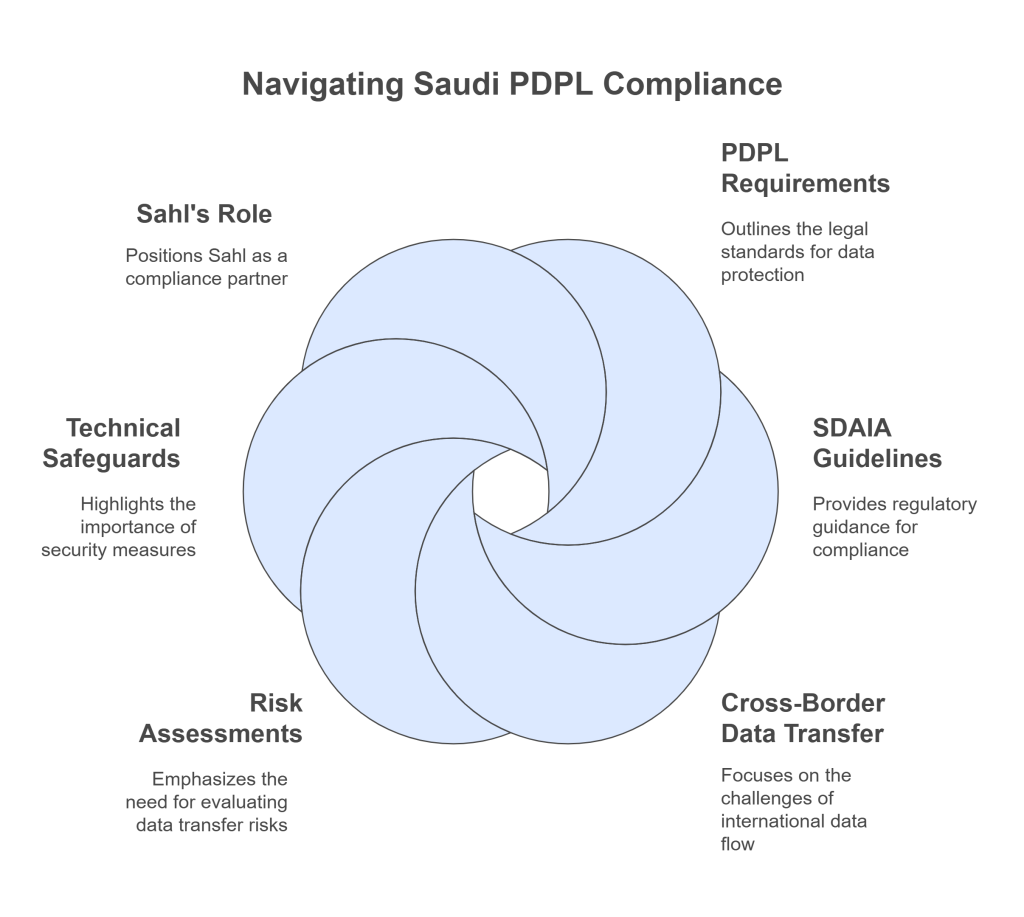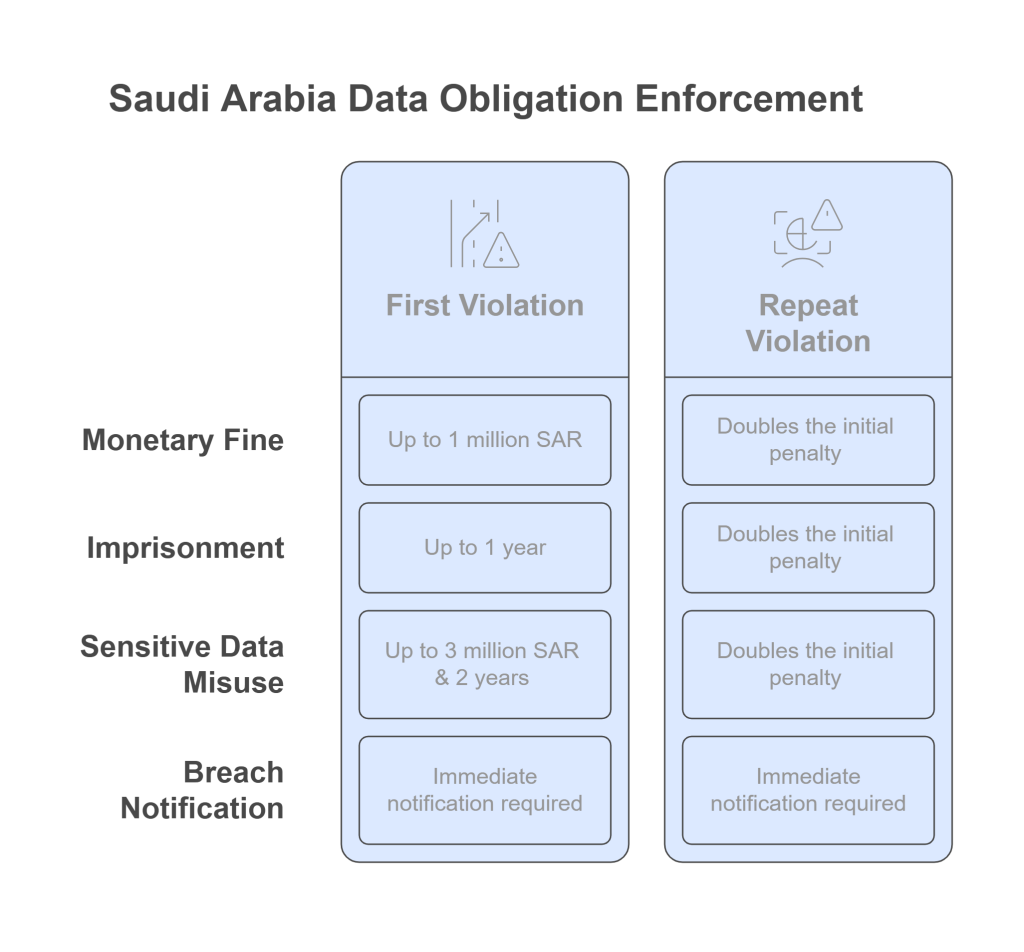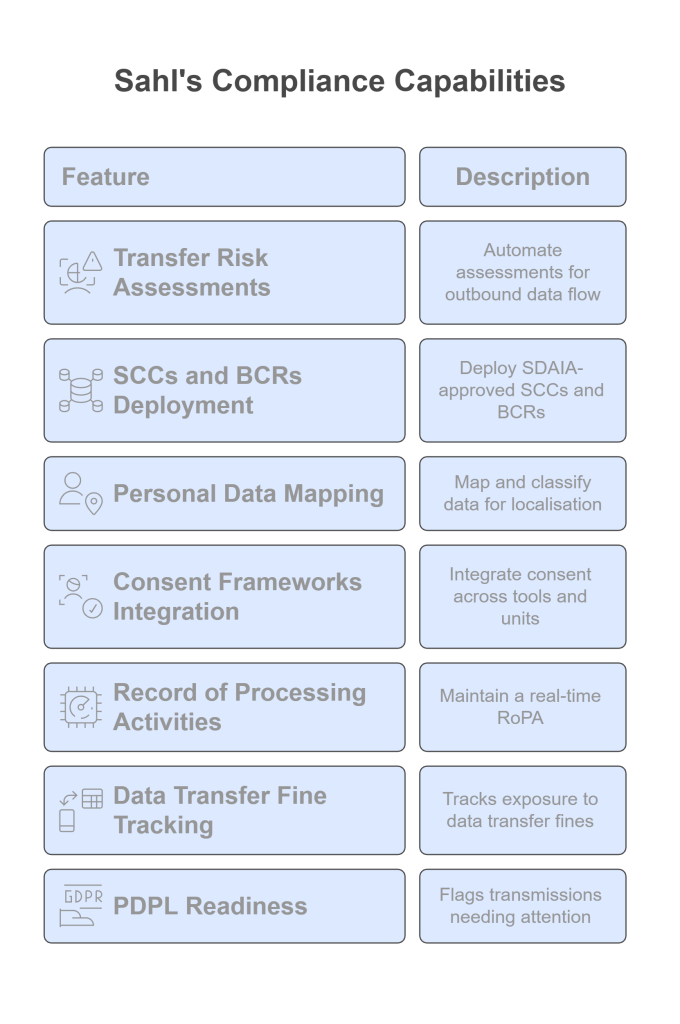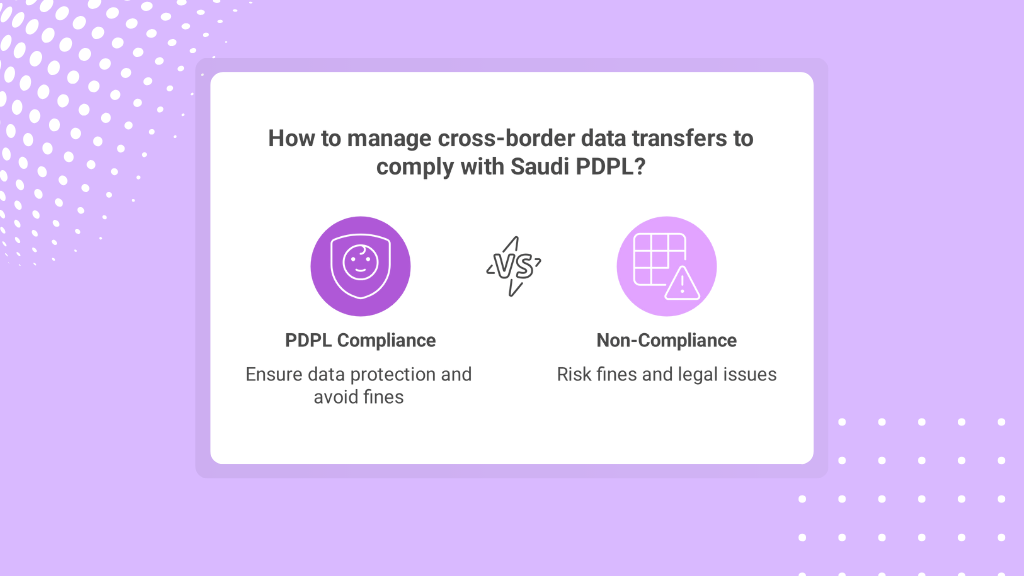As data increasingly flows across borders, organisations working in or with the Kingdom of Saudi Arabia must comply with one of the region’s most demanding data privacy laws, the Personal Data Protection Law (PDPL).
Fully enforced since 14 September 2024, PDPL redefines how personal data can legally be transferred outside the Kingdom. Non-compliance can result in fines of up to 1 million SAR, imprisonment, and serious reputational damage.
At the centre of this legal landscape is the PDPL cross-border data transfer challenge, a complex issue requiring strong oversight, technical safeguards, and fully auditable risk assessments.
To align with global frameworks like GDPR, Saudi Arabia’s regulator, the Saudi Data & Artificial Intelligence Authority (SDAIA), has issued robust implementation guidelines. However, PDPL enforces stricter localisation rules, tighter enforcement timelines, and mandatory risk evaluations. In this evolving environment, Sahl has become the trusted partner for organisations looking for a future-ready, compliant approach to cross-border data transfers.

Why PDPL Cross-Border Data Transfers Are a Legal Priority?
Under Article 29 of PDPL, organisations may not transfer personal data outside Saudi Arabia unless:
- The destination country ensures adequate protection, or
- The organisation implements safeguards like Standard Contractual Clauses (SCCs) or Binding Corporate Rules (BCRs).
Although these mechanisms are familiar to international enterprises, under PDPL they must comply with SDAIA’s localised templates and standards.
Moreover, organisations must conduct Transfer Impact Assessments (TIAs) before initiating any data flow abroad. These are especially critical when:
- The receiving country is not on SDAIA’s adequacy list, or
- Sensitive data is transferred frequently or at scale.
Failing to conduct a TIA could result in penalties or operational suspensions.
✅ Sahl’s compliance automation platform helps businesses stay ahead. It automates TIAs, applies pre-vetted SCCs, and tracks all data flows in real time, drastically reducing the compliance burden on internal teams.
What Saudi PDPL Requires for Cross-Border Data Transfers?
Contrary to popular belief, PDPL doesn’t just require approvals, it mandates proactive data governance.
Organisations must:
- Document the type, frequency, and legal basis of each transfer
- Assess risks to individuals and national interests
- Ensure only the minimum necessary personal data is exported
Even for exempted cases, like emergencies or international treaties, data controllers must apply equivalent safeguards that align with Saudi PDPL standards.
In February 2025, SDAIA introduced its Risk Assessment Guideline, outlining four phases:
- Preparation
- Risk identification
- Compliance evaluation
- National interest impact analysis
While technically non-binding, this guideline has become the de facto standard in regulator audits, particularly since Saudi Arabia’s adequacy list is still pending publication.
Sahl’s regulatory engine stays updated with every SDAIA release, helping organisations instantly align with the latest requirements. From third-party API integrations to cloud platforms, Sahl ensures every PDPL cross-border data transfer is documented and defensible.
What Happens If You Violate Saudi PDPL’s Cross-Border Transfer Rules?
Saudi Arabia is serious about enforcement. Violating cross-border data obligations can trigger:
- Fines up to 1 million SAR
- Up to 1 year of imprisonment
- Up to 3 million SAR and 2 years of jail time for publishing or misusing sensitive personal data
📣 And yes, repeat violations double the penalty.
In case of a breach during or after a transfer, organisations must notify SDAIA immediately and inform affected individuals without delay. Unlike GDPR’s 72-hour window, PDPL has no grace period, making compliance even more urgent.
Clearly, legal advice alone isn’t enough. Businesses need:
- Automated workflows
- Auditable records of transfer decisions
- Continuous monitoring of PDPL cross-border data transfer risk
This is exactly why many Saudi-based and international businesses choose Sahl for ongoing PDPL compliance.

Need a Command Center for PDPL-Compliant Cross-Border Transfers?
Sahl isn’t just another software vendor. It’s a strategic compliance partner designed for organisations that prioritise trust, transparency, and scale.
With Sahl, you can:
✅ Automate Transfer Risk Assessments for every outbound data flow
✅ Deploy SDAIA-approved SCCs and BCRs in just a few clicks
✅ Map and classify personal data to meet localisation mandates
✅ Integrate consent frameworks across tools and business units
✅ Maintain a real-time Record of Processing Activities (RoPA)
📊 Most importantly, Sahl tracks your exposure to data transfer fines and flags every transmission that needs attention, helping you stay PDPL-ready 24/7.defensible, and compliant.

Conclusion: Operationalize PDPL Compliance Before It’s Too Late
Saudi Arabia’s PDPL cross-border data transfer rules have redefined what it means to operate legally in the region. With regulatory pressure mounting, compliance is no longer optional, it’s a growth-critical function.
The law demands a well-documented, technically sound, and legally defensible process. Relying on templates or reactive fixes is risky and costly.
✅ Sahl empowers organisations to operationalise PDPL compliance with clarity and confidence, using automation, legal insight, and real-time dashboards to keep teams ahead of audits and breaches.
Ready to simplify your PDPL cross-border data transfer compliance?
👉 Visit GetSahl.io



